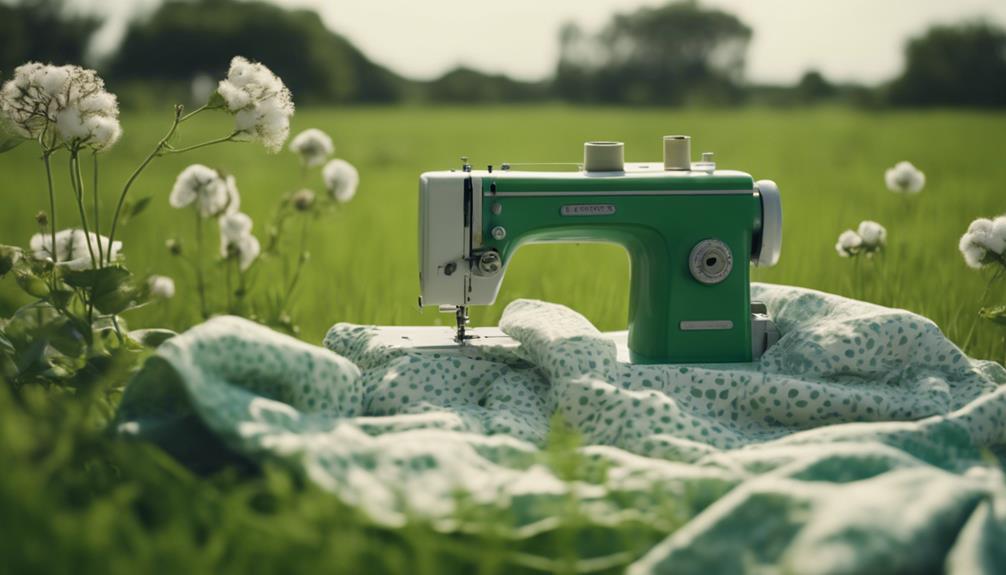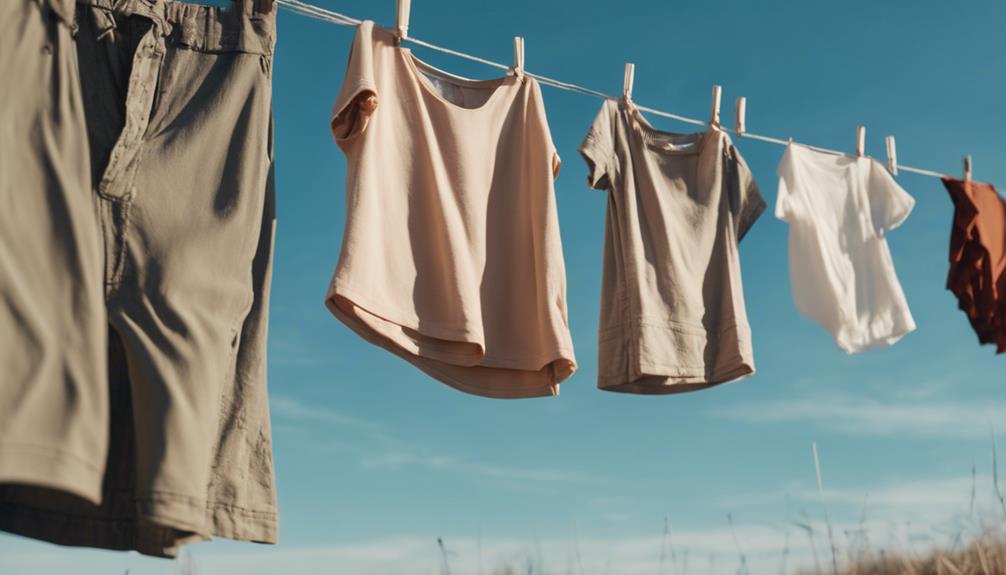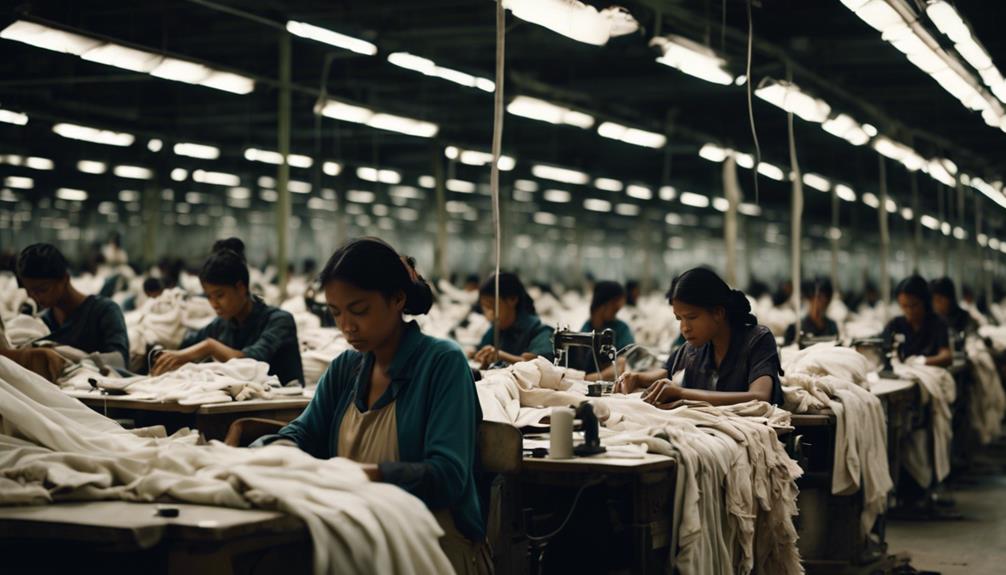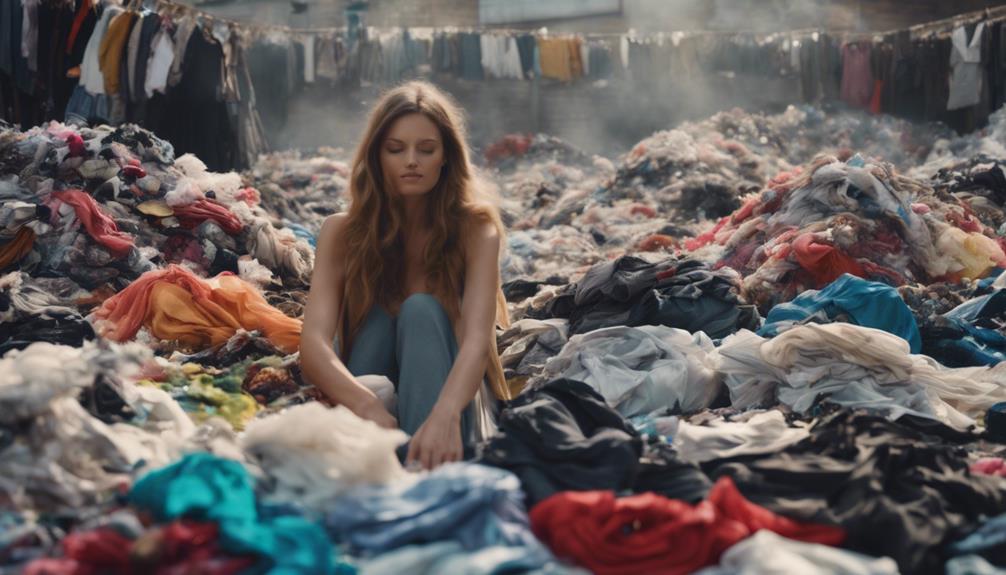Ethical and sustainable fashion is crucial for the environment and the well-being of garment workers. Opting for sustainable choices helps in reducing waste and pollution caused by fast fashion, which results in millions of tons of textile waste annually. It also supports fair labor practices, guaranteeing workers’ safety and fair compensation. By making conscious decisions, you play a part in creating a more transparent and accountable fashion industry, benefiting both the planet and promoting social justice. There is still a lot to learn about how your decisions can influence the future of fashion, so keep exploring!
Key Takeaways
- Ethical and sustainable fashion minimizes environmental impact, reducing pollution and waste generated by fast fashion practices.
- It promotes fair labor practices, ensuring garment workers are treated safely and earn livable wages.
- Mindful consumption encourages consumers to prioritize quality over quantity, combating the throwaway culture in fashion.
- Increased awareness and demand for ethical fashion drive brands to adopt transparent and responsible sourcing methods.
The Importance of Mindful Consumption
Mindful consumption is essential because it encourages you to choose quality over quantity, ultimately reducing waste and supporting sustainable practices in the fashion industry. The fast fashion industry generates about 15 million tons of textile waste annually in the U.S., with a staggering 13 million tons ending up in landfills. By shifting your focus to mindful consumption, you can considerably mitigate this wastefulness.
Every time you purchase clothing, consider the environmental impact and the production methods behind it. For example, producing a single cotton t-shirt uses around 2,700 liters of water. This staggering statistic highlights the need for conscious purchasing decisions. Embracing ethical fashion allows you to support fair labor practices, ensuring that workers aren't exploited under hazardous conditions for minimal wages.
Moreover, the average American discards approximately 80 pounds of clothing each year. By adopting a minimalist approach, you can reduce excess consumption while promoting sustainability. Engaging in mindful consumption fosters awareness of the true costs associated with your clothing choices, urging you to think about their lasting effects on both the environment and the lives of the workers involved in the production process.
Defining Ethical and Sustainable Fashion

When you think about ethical and sustainable fashion, it's crucial to understand their key principles and how they connect. First and foremost, ethical fashion focuses on fair labor practices, safe working conditions, and fair wages for workers throughout the supply chain. On the other hand, sustainable fashion emphasizes environmentally friendly practices, such as using organic or recycled materials and minimizing waste. When considering ethical and sustainable fashion pricing, it’s important to recognize that these values often result in higher production costs, which can be reflected in the price of the final product. However, investing in ethically and sustainably produced clothing supports a more ethical and environmentally conscious industry.
These concepts not only influence individual choices but also impact the global community as a whole.
Key Principles Explained
Ethical and sustainable fashion centers on four key principles: fair labor practices, environmental responsibility, transparency, and animal welfare. These principles guide you in making informed choices that positively impact the fashion industry and the world.
| Principle | Definition | Importance |
|---|---|---|
| Fair Labor Practices | Ensuring workers are treated ethically and paid fairly. | Upholds human rights and dignity. |
| Environmental Responsibility | Minimizing waste and using sustainable materials. | Reduces the industry's environmental impact. |
| Transparency | Being open about the sourcing and production processes. | Builds trust and accountability in the supply chain. |
| Animal Welfare | Advocating for humane treatment of animals in fashion production. | Promotes ethical practices and respect for living beings. |
Interconnectedness of Concepts
Understanding the interconnectedness of ethical and sustainable fashion reveals how both concepts work together to create a more responsible and accountable industry.
Ethical fashion focuses on improving working conditions and ensuring fair labor practices within the production process, particularly in garment factories. It highlights the humane treatment of workers, addressing the negative impact of exploitative practices that plague the industry.
On the other hand, sustainable fashion emphasizes eco-friendly practices, aiming to minimize environmental impacts while promoting renewable resources and biodegradable materials. By integrating sustainable methods, fashion brands can meaningfully reduce their carbon footprint and waste, which currently amounts to 92 million tons globally each year.
Both ethical and sustainable fashion call for systemic changes in the industry, ensuring that the rights of workers and the planet are prioritized. They overlap in their mission to create a holistic approach to fashion that respects both people and the environment.
Impact on Global Community
The impact of ethical and sustainable fashion on the global community is profound, shaping not only industry practices but also consumer awareness and societal values. By embracing ethical and sustainable practices, you contribute to a movement that prioritizes fairness and ecological responsibility. This fashion movement addresses critical issues like modern slavery and child labour, ensuring that workers around the world are treated justly and work in safe conditions.
Here's a quick overview of the major impacts:
| Impact Area | Description |
|---|---|
| Environmental | Reduces waste and tackles water scarcity in supply chains. |
| Social | Promotes fair labor practices, combating modern slavery. |
| Consumer Awareness | Encourages support for ethical brands and transparency. |
Impacts of Fast Fashion

Fast fashion has serious environmental consequences that you mightn't even realize, from massive textile waste to high water pollution levels.
It's also tied to human rights violations, as many workers endure poor conditions for minimal pay.
Understanding these impacts is essential for making more ethical and sustainable fashion choices.
Environmental Consequences of Fast Fashion
Fashion's rapid production cycle considerably harms the environment, contributing to climate change and overwhelming landfills with waste.
The fashion industry is responsible for 8-10% of global greenhouse gas emissions, a staggering figure that highlights its role in climate-related issues. When you consider that producing just one cotton t-shirt requires about 2,700 liters of water, it's clear how fast fashion leads to immense water waste.
Each year, the U.S. generates around 15 million tons of textile waste, with nearly 13 million tons ending up in landfills. These textiles can take decades to decompose, creating significant environmental consequences.
Additionally, the dyeing and finishing processes involved in conventional cotton production contribute to 20% of global industrial water pollution, severely affecting local ecosystems.
Human Rights Violations
While you might enjoy the latest trends, it's crucial to recognize the human rights violations that underpin the fast fashion industry. Many garment workers toil in unsafe conditions, often for a pittance that doesn't even meet a living wage. The tragic Rana Plaza collapse, which killed over 1,100 workers, starkly illustrates the dangers faced by those producing cheap clothing.
Fashion brands prioritize low production costs, leading to the exploitation of vulnerable workers, including children and trafficking victims. These individuals often endure threats and intimidation to return to their unsafe jobs. The demand for inexpensive garments fuels this cycle of exploitation, pushing brands to overlook ethical practices in favor of profit.
Despite guidelines from the International Labour Organization (ILO), many fashion companies continue to violate established worker protections.
You can make a difference by choosing sustainable and ethical fashion options that respect human rights and support fair treatment for garment workers. By being mindful of your purchasing decisions, you can help combat the exploitation that plagues the fast fashion industry and advocate for better working conditions worldwide.
Garment Worker Exploitation

Garment workers often face exploitation in the form of unsafe working conditions and meager wages, driven by the relentless demand for inexpensive clothing. This exploitation is particularly severe in the fast fashion industry, where brands prioritize profit over people. You might be surprised to learn that many workers endure hazardous environments, risking their lives for low wages.
In fact, over 1,100 garment workers tragically lost their lives in a building collapse in Bangladesh, a stark reminder of the human cost associated with these poor working conditions.
Moreover, child labor and human trafficking are rampant in the fashion supply chain, highlighting severe social injustices. Many children are forced to work in factories, robbed of their childhood and education.
As you consider your clothing choices, it's crucial to recognize the impact of your purchases. Sustainable fashion and ethical fashion practices aim to combat these issues by promoting fair wages, safe working conditions, and transparency in the supply chain.
Consumer Awareness and Responsibility

As consumers become more aware of the impact of their choices, they're increasingly seeking out sustainable and ethical fashion options. This shift shows that you, as a buyer, hold significant power in shaping the industry. With two-thirds of consumers now considering sustainability, there's a high demand for brands that prioritize ethical practices. By choosing sustainable fashion, you directly support the millions of garment workers who often face exploitation in the textile and clothing industry.
Mindful purchasing encourages transparency in the manufacturing process and helps combat the fast fashion cycle. You can make a difference by opting for used clothing or participating in clothing swaps, promoting a circular fashion economy that reduces waste. This not only lessens the environmental impact but also fosters a sense of community around fashion.
Platforms dedicated to ethical fashion education empower you to make informed choices, pushing brands to be more accountable. As you embrace these practices, you're contributing to a larger movement that values both people and the planet, ensuring that future generations can enjoy a sustainable and ethical fashion landscape. Your awareness and responsibility can drive real change in the industry.
Future Trends in Ethical Fashion

The future of ethical fashion is poised for exciting transformations, driven by innovations and consumer demand for sustainable practices. As you become more aware of the impact of your choices, you'll notice a significant shift toward sustainable fashion that prioritizes ethical practices.
Second-hand markets and rental services are gaining traction, offering you eco-friendly alternatives while reducing waste through shared consumption models.
Innovations in textile technology, including lab-grown materials and advanced recycling methods, are set to revolutionize production methods. These advancements not only address climate change but also enhance sustainability in the industry.
You'll also see more collaborative initiatives between brands and environmental organizations, fostering a community focused on effective ethical standards.
Anticipated legislative changes will promote transparency and accountability, compelling brands to adopt responsible sourcing and manufacturing processes.
As online platforms dedicated to ethical fashion education expand, your consumer awareness will grow, driving demand for sustainable business models.
Frequently Asked Questions
Why Is Sustainable and Ethical Fashion Important?
Sustainable and ethical fashion matters because it protects the environment and promotes fair labor practices. You can make a difference by choosing brands that prioritize eco-friendly materials and support workers' rights, creating a positive impact together.
Why Are Ethics Important in Fashion?
Imagine vibrant fabrics woven with care, not exploitation. Ethics in fashion matters because it guarantees workers' dignity, promotes transparency, and nurtures the planet. Your choices can spark change, creating a more humane industry for all.
What Is the Relevance of Sustainable Fashion in Today's World?
Sustainable fashion's relevance today lies in its potential to combat climate change, reduce waste, and improve workers' conditions. By choosing eco-friendly options, you contribute to a healthier planet and promote ethical practices in the industry.
Is Ethical and Sustainable Fashion the Same?
When it comes to fashion, they're two sides of the same coin. You'll find ethical fashion focuses on humane treatment, while sustainable fashion emphasizes environmental care. Both aim to create a better world for everyone.
Conclusion
As you walk through the forest of fashion choices, remember that every step you take leaves a mark.
Choosing ethical and sustainable fashion isn't just a trend; it's planting seeds for a healthier planet and fairer lives.
By supporting mindful brands, you're nurturing a garden of hope, where workers thrive and nature flourishes.
So, let your choices bloom beautifully, transforming the landscape of the industry and ensuring a vibrant future for generations to come.









